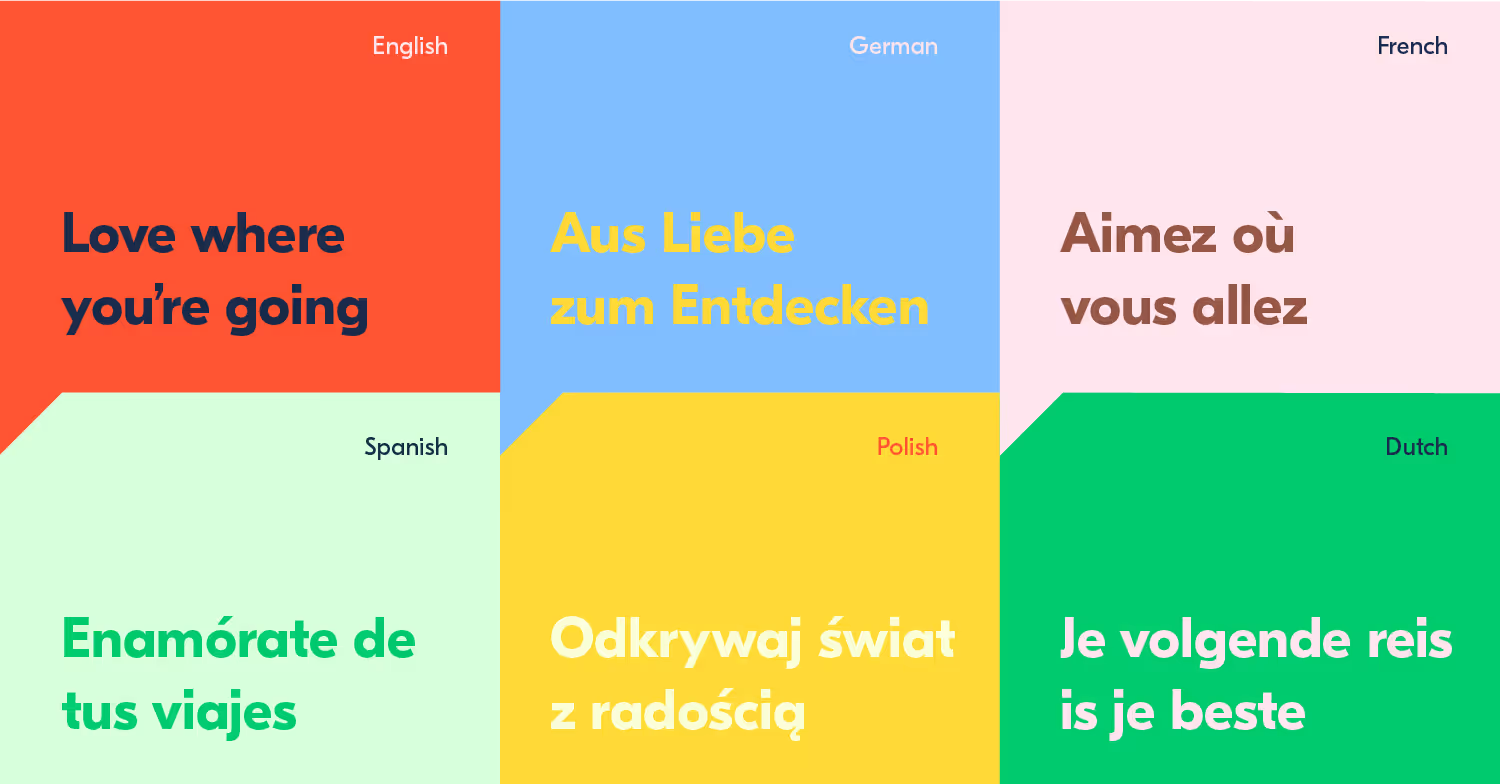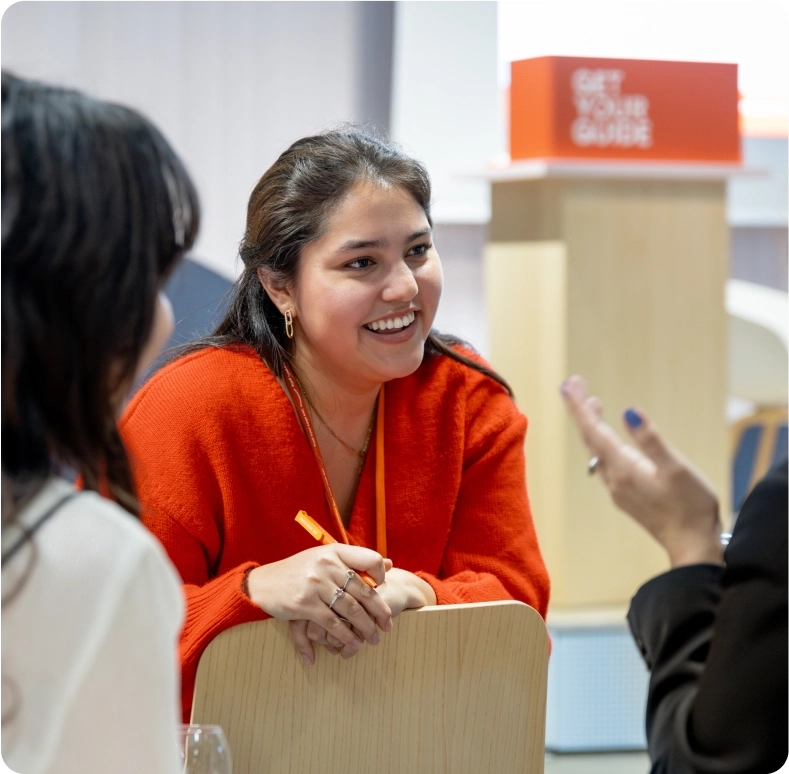Creating a Memorable Slogan, No Matter the Language
GetYourGuide will never stop turning trips into amazing experiences, but after the rebranding last summer, we did change our slogan.

Key takeaways:
In today’s post, the Localization team details how they brought our slogan, “love where you’re going,” to life for our multi-lingual customers around the world.
{{Divider}}
GetYourGuide will never stop turning trips into amazing experiences, but after the rebranding last summer, we did change our slogan. A slogan is a brand’s way of saying “hello,” so the Localization Team had to make sure the tone of voice and intention of the English original was carefully transferred into our own languages. Not only that, we also had to take character limits into account and ensure the new tagline sounded natural and appealing.
Love where you’re going is simple, captivating, and represents exactly what GetYourGuide is aiming to do: make travelers fall in love with their destination. Being able to identify with this message should not be restricted to our English-speaking customers only — this is where the Localization team comes in.
With a very tight and very hard deadline as well as a rigid character limit, the Localization team got down to business. This is what our in-house team came up with:
Melanie Spies and Marcel Riek, German Language Specialists:
The literal translation didn't work at all in German, so we experimented quite a bit. Our first idea, Aus Liebe zum Reisen (For the love of traveling), was a no-go since it’s unfortunately used by a supermarket chain. We then changed it to Aus Liebe zum Entdecken, meaning For the love of discovering. Our CEO, Johannes, loved it immediately, and it grew on us too. Now we think it's a much better fit than Reisen, since what we do is more about discovering new places and experiences than travel in general.
Loïc Bondroit, French Language Specialist:
Aimez où vous allez literally means love where you're going. Although they are often a translator's first instinctive draft, literal translations usually result in an unnatural, odd-sounding phrasing that is quickly dropped. In the case of love where you're going French was an exception to the rule by a stroke of luck. Not only did those words fit nicely together, the slogan was further complemented by a pleasant assonance. Aimez où vous allez sounds like it was intentionally phrased to rhyme. We had to come around to it, but amongst all the other options, this slogan definitely stood out.
Diana Martín, Spanish language specialist:
The literal translation of the sentence did not work in Spanish. We have a lot of verbs that need a clear object, and with such a short sentence without further context, “fall in love” or “love” are two of these verbs. Neither Ama donde vas nor Enamórate de donde vas sound natural in our language.
Enamórate de tus viajes literally means Fall in love with your trips. However, we use the word viaje in Spanish for anything related to travel or journey. In this way, it captures the essence of both the direction you are going and the place you are visiting. By using it in plural, we underline the idea that we are not the ones organizing the trip, but rather we are the ones providing the tools to help customers love where they’re going every time. The literal translation of the verb love (amar) is not used often in Spanish from Spain, since it has a very narrow meaning. Fall in love, however, means we are the ones making you love the place where you are going — thanks to our amazing range of activities and experiences.
Agnieszka Czerwonko, Polish language specialist:
I quickly came up with something I liked: Zakochaj się w podróżach, meaning Fall in love with traveling. However, after a short investigation, I learned this slogan was already taken. So, the Polish version of Love where you're going became Odkrywaj świat z radością, or, Explore the world with joy. This may seem too far removed from the original, but localization isn’t about literal translation, it’s about selecting words that evoke the right emotions and associations. Traveling, exploring, and discovering new places are associated with positive emotions such as love and joy — in both the original and the transcreated version.
Mette Thomsen, Edvina Fahlqvist, and Kristoffer Andersen, Danish, Swedish, and Norwegian language specialists respectively:
Scandinavian languages are closely tied together, so it made sense for us to work on the new tagline together. The direct translation did not work at all in our languages, so after sitting down together and discussing it thoroughly, we landed on the equivalent of Love your next journey. In all three languages we have chosen the object rejse/resa/reise carefully, as it leans more towards a journey than towards just a trip. We intended to grasp that whatever a journey is for you, you will love it.
We also placed an emphasis on the next journey, which we think corresponds great with Love where you're going — as in love where you're going next.
Eleonora Allegrini, freelance Italian language specialist:
Love where you're going sounds great and captivating in English, but the literal Italian translation didn't evoke all the sentiment of the original. To make it attractive to the Italian audience, I changed both grammar and syntax in my version. Eventually, I came up with Innamorati dei tuoi viaggi, which means Fall in love with your trips/travels.
I wanted our customers to literally fall in love with their travel experience, from the beginning of the booking process to the end of their trip. They would not only love the chosen destination, but the entire experience. Furthermore, the word viaggi can mean trip, travel, and journey, suggesting more than one meaning. It could be either just one trip or holiday, or even the journey of a lifetime.
Fabio Luiz, Brazilian Portuguese language specialist:
For Portuguese, the transcreation came quite naturally; within 15 minutes I was done. It wouldn't make any sense to literally translate Love where you're going, so I replaced where you're going with your destination. The Portuguese word for destination also means destiny, adding a double meaning to the tagline. The final version became Ame seu destino: Love your destiny/destination.
Iris Molenaar, Dutch language specialist:
In Dutch, the literal translation didn't sound very natural either. Inspired by what the Scandinavians came up with, I decided to go with Je volgende reis is je beste, which means Your next journey/trip is your best one. I felt it aligned nicely with our aim to give our customers incredible experiences. It has this positive charge of “no matter how great your previous journeys were, with us, your next one will be even better.” In other words: you can trust us with your travel planning!



.JPG)
.JPG)

